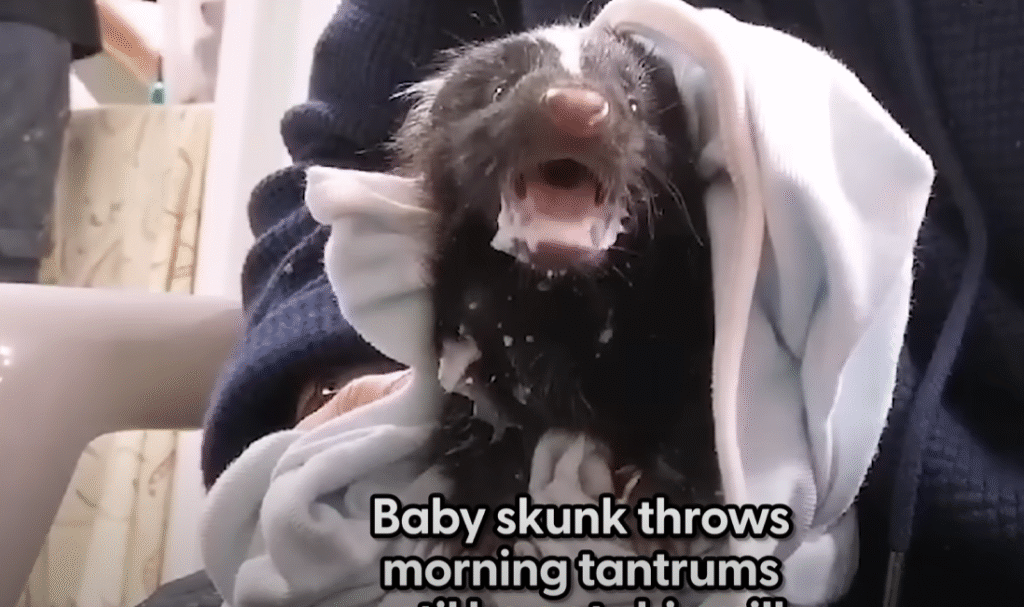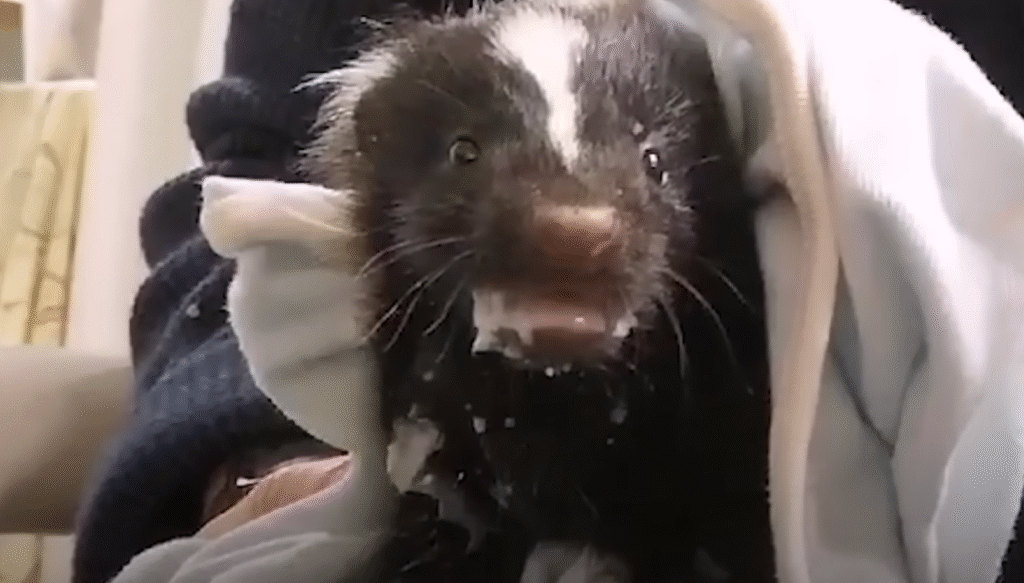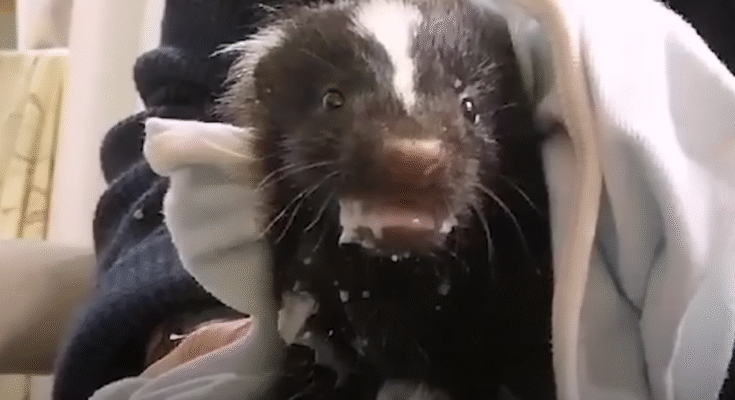In a quiet countryside town, tucked between rolling fields and tall forests, lived a baby skunk who had recently become the star of the neighborhood. His name was Pip, and despite his small size and fluffy black-and-white fur, Pip had a personality much bigger than anyone expected.
Pip had been rescued as a tiny kit after being found alone near the edge of the woods. His mother was nowhere to be seen, and a kind woman named Clara decided to take him in until he was old enough to return to the wild. Clara already had a small family of rescue animals—two dogs, a cat, and a curious parrot. Pip fit right in, though he quickly made it clear he was unlike any of the others.

From the very first week, Pip discovered something important: throwing tantrums got him what he wanted.
At breakfast one morning, Clara set bowls on the floor for the dogs and placed Pip’s small dish of fresh fruit and soft grains nearby. Pip waddled over, sniffed his bowl, and frowned—or at least, he looked like he was frowning, with his tiny face scrunching up in disapproval. Instead of eating, he flopped on his back, kicked his little legs in the air, and let out squeaky chirps that echoed through the room.
Clara bent down, worried. “Pip, what’s wrong? Don’t you like your food?”
But Pip wasn’t sick or unhappy—he simply wanted the scrambled eggs on Clara’s plate instead. The moment Clara gave him a tiny piece, Pip’s squeaking stopped. He munched happily, his tantrum instantly forgotten.
It was the beginning of a pattern.

Whenever Pip wanted attention, he would stomp his little paws, flick his tail dramatically, and squeal until someone noticed him. If Clara was busy working in the garden, Pip would shuffle to the edge of the flowerbed and plop down, making sad little whines. If she didn’t react quickly enough, he’d roll onto his side and let out a louder squeak, as if saying, “Hey! Don’t ignore me!”
The dogs soon caught on, too. Whenever Pip wanted to play with their toys, he would run up, paw at them, and then throw a “fit” if they didn’t give in. The older dog, Bruno, would sigh, pick up his chew toy, and drop it in front of Pip just to stop the squeaking. Pip would immediately wag his fluffy tail, triumphant.
Clara couldn’t help laughing. “Oh, Pip,” she would say, “you are the most dramatic baby skunk I’ve ever met.”
One afternoon, Pip’s tantrum skills reached new heights. Clara had been preparing snacks in the kitchen when Pip waddled in, nose twitching at the smell of fresh strawberries on the counter. He stretched his little body upward, but the fruit was out of reach.
Instead of giving up, Pip began his performance. First, he tapped his paws impatiently. Then he let out squeaky cries, louder and louder. Finally, he rolled onto his back in the middle of the kitchen floor, flailing his tiny legs as if the world had ended.
Clara, trying not to laugh, crouched down. “You little rascal! You can’t have tantrums every time you want strawberries.”

But Pip knew exactly what he was doing. He paused just long enough to look at Clara with his round, shiny eyes. Then he squeaked again, pitifully. Of course, Clara gave in. She sliced up a strawberry and placed a piece on the floor. Pip leapt to his feet, happily gobbling it up as if nothing had happened.
News of Pip’s antics began to spread through Clara’s circle of friends. When visitors came by, they were amazed to see the baby skunk’s expressive demands. He would squeak for pets, stomp for snacks, and even toss himself dramatically into someone’s lap if he felt ignored.
“He’s like a toddler in a skunk suit,” one neighbor joked.
But behind all the tantrums was a sweet truth: Pip wasn’t spoiled—he just wanted love and attention. Having lost his mother so young, he was learning how to communicate in the only way he knew how. Clara made sure he was safe, fed, and cared for, but Pip made sure everyone around him knew when he wanted a little extra.

As the weeks passed, Pip grew stronger and healthier. His tantrums didn’t stop, though—they only got more creative. One day, when Clara was talking on the phone and not paying attention to him, Pip dragged a small blanket into the middle of the living room and curled up dramatically, squeaking in protest. Clara had to excuse herself from the call just to scoop him up and reassure him.
The parrot, Mango, even started mimicking Pip’s squeaks. Whenever Pip threw a tantrum, Mango would copy the sound from his perch, making it seem like there were two baby skunks demanding attention. Clara often found herself laughing so hard she couldn’t stay frustrated.
Through it all, Pip’s tantrums never pushed Clara away—they only deepened her affection. “He’s just telling us what he needs,” she often explained to curious friends. “And honestly, I think he’s teaching us something important: sometimes, we all need to ask for love a little louder.”
Eventually, Clara knew Pip would be ready to return to the wild. But until that day came, she cherished every dramatic squeak and every paw stomp. Breakfasts with Pip were lively, afternoons were full of giggles, and evenings always ended with Pip curling up in her lap, content once his little “demands” had been met.
The day Pip was finally introduced to a safe wildlife sanctuary, Clara felt proud but bittersweet. The staff marveled at how healthy and spirited he was. Pip, true to form, squeaked loudly when placed in his new enclosure. Everyone laughed, already seeing his big personality shine through.
“He’ll fit right in,” one caretaker said. “This little guy knows how to make himself heard.”
Back at home, Clara reflected on the months she’d spent with the baby skunk who threw tantrums to get what he wanted. To her, those tantrums weren’t signs of trouble—they were signs of resilience, of a tiny creature finding his voice in a big world.
And so, Pip’s story became a heartwarming reminder: sometimes, even the smallest animals can have the loudest ways of saying, “I matter, and I need love.”



